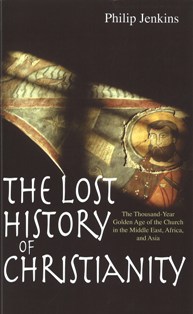
Lion, 2008
RRP $27.95
Reviewed by Jock Dunbar, a Minister of the Word Intern at St Mark’s Mount Gravatt Uniting Church.
IN The Lost History of Christianity, Professor Philip Jenkins tells “the story of the churches in the East and how they became extinct” from the years following the fall of the Roman empire in the West to the fall of the Byzantine Empire.
Christianity has long been defined and told from the dominant view of the West, namely Western Europe (e.g. Roman Catholicism and Protestantism).
Mr Jenkins wishes to address the imbalance in selectively retelling the “successes” of Christianity and ignoring the “failures”. He challenges the conventional understanding that church survival equates with church success.
Mr Jenkins draws the reader to reevaluate the contribution of the Nestorian and Jacobite churches and appreciate them more like modern day church denominations rather than dismiss them as heretics. He covers the relationship between Islam and Christianity, offering a complex story of tolerance in one location and intolerance in another, which provides an interesting point of reference for Christianity’s contemporary engagement with other religions and forms of thought, particularly with Islam. He also touches on the decline of the church in the west today and the growth of the church in eastern and developing countries.
Mr Jenkins’ analysis of history not only takes into account social and political situations, but also environmental. In this way, he demonstrates a holistic approach to the telling of history. Theologically, he argues that Christianity is essentially defined by failure and from this perspective offers the legitimacy of learning about this period of Christian history. He sometimes slips into oppositional language, which I found unnecessary.
I highly recommend this book for any person interested in the history of Christianity.
 JourneyOnline
JourneyOnline






